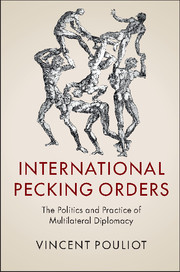Book contents
- Frontmatter
- Contents
- List of figures
- List of tables
- Preface and acknowledgments
- List of abbreviations
- Introduction: All the world's a stage
- Part I Situations
- Part II Dispositions
- Part III Relations
- Part IV Positions
- 7 State practices and multilateral fields
- 8 The field logics of multilateral pecking orders: NATO and the UN compared
- Conclusion: The “miracle” of multilateral pecking orders
- Appendix: Research design, methods and data
- References
- Index
7 - State practices and multilateral fields
from Part IV - Positions
Published online by Cambridge University Press: 05 March 2016
- Frontmatter
- Contents
- List of figures
- List of tables
- Preface and acknowledgments
- List of abbreviations
- Introduction: All the world's a stage
- Part I Situations
- Part II Dispositions
- Part III Relations
- Part IV Positions
- 7 State practices and multilateral fields
- 8 The field logics of multilateral pecking orders: NATO and the UN compared
- Conclusion: The “miracle” of multilateral pecking orders
- Appendix: Research design, methods and data
- References
- Index
Summary
The diplomatic processes out of which international pecking orders emerge take place on a playing field that is structured in a number of ways. Local rules of the game enable and constrain the struggle for practical mastery (Part I: Situations). The diplomatic sense of place orients practices in some directions instead of others (Part II: Dispositions). The morphology of permanent representation generates a set of practical logics within the configuration (Part III: Relations). In Part IV of the book (Positions), I look at how multilateral diplomacy is also structured positionally, in terms of the countries that are being represented at the table. State representatives are not equal to each other in terms of the corporate entity that they are speaking and acting for. Representing a given country may grant certain opportunities that other delegates do not have. This and the next chapters explore how diplomatic practices are imbricated with the broader field of states.
How exactly do states make their way to the multilateral table? In this chapter, I seek to identify the kinds of practices by which governments may benefit, or not, permanent representatives and their team on the ground. The basic insight is that what governments do (and do not do) provide opportunities and constraints in the practice of multilateral diplomacy. I start from the observation that states position themselves within the membership with unequal dexterity and channel their resources to IOs in variable amounts. Some capitals invest a lot, materially or symbolically, in a given platform, while others are much more constrained. On a different plane, governments may take positions (and send attendant instructions) that are more or less mainstream compared to that of other partners, thereby facilitating or complicating the work of delegates. Some state practices are much better attuned to local requirements, for instance by providing the kind of expertise needed at the permanent mission and inside the multilateral group. In all of these cases, state practices (including the resources they mobilize) need to be converted by the diplomats on the ground in order to have any impact on pecking order dynamics. Bringing states back in need not push diplomacy out.
- Type
- Chapter
- Information
- International Pecking OrdersThe Politics and Practice of Multilateral Diplomacy, pp. 193 - 225Publisher: Cambridge University PressPrint publication year: 2016



